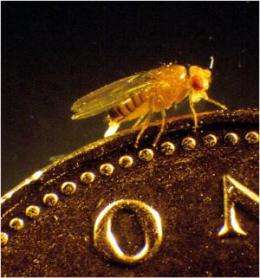Fruit flies get kidney stones too

Kidney stones are agonising, and can lead to medical complications. There are many causes and types of stone, but the number of cases diagnosed is continuing to rise. Short term treatment, as anyone who has suffered from this condition will know, can involve high strength painkillers and ultrasound to shatter the stones and allow them to pass. However, even with this course of treatment there is still a 60% risk of reoccurrence, and attempts to find preventative treatments have been hindered by the difficulties in finding a ‘model’ system; stones are likely to be as agonizing for lab animals as for humans.
But Professor Julian Dow at the University of Glasgow, working in collaboration with Professor Michael Romero in the Mayo Clinic in the USA, has shown that fruit flies rapidly and reliably get kidney stones when exposed to certain dietary foods. At a Genetics Society of America’s 53rd Annual Conference in Chicago, Professor Dow’s team showed that the formation of stones could be followed in real time down the microscope.
“This is the first time that we have been able to see new stones at the moment of formation” Prof. Dow explained. “Unlike the human kidney, the simple fruit fly kidney tubule is easily accessible and transparent; and unlike us, fruit flies seem quite unconcerned by the presence of stones. This means that we can now screen fruit flies for compounds that can stop new stones forming, and so one day perhaps we will be able to offer protection against recurrence for patients with a history of stone formation.”
The research teams have already identified a gene that encodes a protein which transports oxalate into the fly kidney. When this gene is ‘knocked down’ genetically, flies get fewer stones. This means that the groups have a specific target to study as a candidate for drug development.
The fruit fly kidney is not just useful for the commonest kidney stones. The Dow and Davies labs in Glasgow are successfully modelling a class of diseases called “inborn errors of metabolism”. For example rosy, a well-known mutant of Drosophila, develops orange kidney stones, and deformed kidney tubules, just like the rare human genetic disorder xanthinuria. In collaboration with Strathclyde University, they are using the new science of metabolomics to study how such mutations cause some compounds to ‘back up’ and accumulate at very high levels, while others can be severely depleted.
Such diseases are much more common where cousin marriages are widespread. Professor Dow is also a visiting Professor at King Saud University in Riyadh where he has found that every newborn in Saudi Arabia is screened for 20 different inborn errors of metabolism. “Our hope is that, by using a relatively inexpensive and flexible disease model like Drosophila, we can help with at least some of these important diseases”.
















